- Home
- Elin Hilderbrand
Reunion Beach Page 3
Reunion Beach Read online
Page 3
After Beatrice uttered her own version of that line on Lachlan’s doorstep, then it would be off to bed to make love. They would, for the rest of their lives, talk about that moment.
She turned on the water and held her hand under the spray while waiting for it to heat up. An hour later, spruced up, she surveyed her image with care: yes, all was a bit haggard but okay. Her dark hair had been blown to its smooth shoulder-length swing, the blotches from a sleepless night covered with makeup and her blue eyes slightly less cloudy with the addition of coffee. She wasn’t the hottest fifty-five-year-old in the city, but that was never her goal. Hot had never been in her bag of tricks; classy and artsy yes, smokin’ no.
The hangover a dull memory that lived on as an ache behind her eyes, and as cotton padding around her thoughts, she picked up her cell to see that Lachlan had left a voicemail.
She smiled. Not so bad, after all. Really. She’d made the entire situation worse in her mind.
She clicked on the voicemail, putting it on speaker to listen while she brushed her eyelashes with mascara.
“Bea.” He paused. Beatrice smiled at herself in the mirror, at his soft voice using her nickname.
“I think we need to be apart for a while, take a breath. I don’t know what that means, really, but do not call or come over right now. Thank you.”
Silence.
My God. He had never before used that tone of voice. That kind of finality.
Beatrice’s stomach lurched and she bent over, heaving her breakfast, her hangover, and her heartache into the sink of her immaculate white bathroom.
“No!” she said out loud, and it came out more like a moan than a word. A breath or two as she leaned over her sink, and the nausea passed. She grabbed her toothbrush and squirted double the amount of toothpaste as it ran over the side of the brush; she scrubbed the taste of bile from her mouth and then set to cleaning her mess.
Respect his request? What the hell did that mean?
When the bathroom looked as pristine as it had before her emotions took over, and the towels had been dropped into the washing machine, Beatrice rushed to the kitchen and did the only thing her fizzled mind allowed her to do—finish what she’d started with her birds. This group of women who’d started as college roommates, become bridesmaids, and continued to be her dearest friends had once chosen a bird to represent each one of them. From that moment forward they’d become “the flock.” Now they would gather and reconnect—it had been too long, almost two years—chat about the old days and help Beatrice figure out her new days. She would draw birds, reconnect with her flock. Yes. This was a very good plan.
She’d take a big breath before making another huge decision that might upend her life.
3
The House
Mid-afternoon sun heated the July air to its steaming point as Beatrice stepped off the small motorboat to gaze up at the cedar-shake one-story cottage that sat on the edge of the coastal river, or if Beatrice was completely honest, almost in the water. The waves would lap the house right up within the next generation. But she didn’t need the house to last longer than the weekend, so it wasn’t her concern.
The Lowcountry island called Oak Island was deserted save for this one house; the instructions on the rental site had been clear and easy: bring everything you need. No stores. No grocery. A getaway on a spit of land just off Savannah with its own beach, dock, and four bedrooms. Cushioned on the east side by the ocean and the west side by the coastal river, it was both safe and comfortable for a weekend getaway.
Perfect, right?
Beatrice stood by herself at the end of the splintered and sun-washed dock and looked around, cataloging her surroundings. Not fancy. Rose would love it; Victoria would complain about the lack of spa and services; Daisy would find the good in it and immediately start the party. Or these were Beatrice’s best guesses, based on decades of friendship.
So far, it seemed everything Beatrice had imagined when she read “getaway” under the house photo posted online. From Savannah, it was only a ten-minute boat ride (very bumpy, very wet boat ride with a kind man about her age if she had to guess, with a baseball cap covering curly hair) to the flat low island a mile wide, a mile long. Making the journey ahead of the rest of the flock, she now observed the overgrown island’s scrubby palmetto trees, Spanish moss hanging like the hair of some giant, and a crescent moon–shaped beach just the right size for four women and a cooler.
The squeaky call of what Beatrice identified as the brown-headed nuthatch and the musical trill of a sparrow combined in symphony with the slap-slap of water on the wobbly dock. The pure sounds were enough to slightly soothe her aching heart. Wait, that wasn’t right. Beatrice realized it wasn’t just her heart that ached—all of her from ego to pride hurt like hell. But her birds would make it right; she was quite sure.
The boat’s captain carried all of Beatrice’s food and drink supplies, along with her overnight bag that held nothing but sundresses, hats, and bathing suits. And then there were two bags with enough chips and salsa to kill them all if they chose to die that way.
Beatrice approached the house when the screen door slammed and the man’s flip-flops hit the earth as he jumped from the top step, denting the soft sandy ground, and held out his hand. “Guess it’s near time for a proper introduction. I’m Red.” He removed his sunglasses, and there were soft brown eyes with a rim of green. His smile reached his ears and folded his sun-crinkled skin to his eyes; his chin bore an S-shaped scar and half of his thick left eyebrow was missing.
“Beatrice.” She took a few steps toward him onto the soft grass and held out her hand and shook his calloused one. “Nice to formally meet you.” She spread her hands out. “This is a downright wonderful place for our secluded weekend. Please tell the owner thank you for renting it to us.”
“You just thanked him.” Red’s smile teased.
“Oh.” Beatrice paused. “I thought his name was Ned Blackstone. I sent the money to—”
“Well,” Red said in a Southern accent so melodic it sounded false. “That’s my first name. Red’s the second, given to me by my little brother, and the one that stuck.”
“Well, Red and Ned, thank you. The other women will be at the dock in—” Beatrice yanked her cell phone from her sundress pocket and noticed there were zero bars. No service. None. But the clock worked. “—an hour.”
“I’ll be there to ferry them over,” he said. “Would you like some help unpacking and getting settled?”
“I think I’ve got it. And it’s awkward—you know, me unpacking in your house while you’re here. I think maybe—”
He nodded. “I get it. I’ll make myself scarce while you do what needs gettin’ done.”
Beatrice stared at him for a moment. Everything he did was so slow, not in an unintelligent way, but how a man moves when he knows the entire world is at his fingertips and things will just be fine, totally fine. Meanwhile, Beatrice was switching from one foot to the next, bounding around like she had somewhere to be and something to do, like save the world from the next nuclear bomb.
“Is there . . . I guess I should have asked before I rented it . . . is there internet or a way to get cell service out here?” She held up her phone as proof of nothing.
“Depends which provider you’ve got. Some can get service at the very tip of the island if they hold the phone tilted toward Savannah. Seems there’s a black spot here. Not that I mind so much.”
“But how do you run a business if you don’t have . . . ?”
He smiled and walked away, heading toward the back of the house, doing what he called making himself scarce, she assumed. Well, that would explain the day or two it had taken him to answer her first email.
Once inside, she glanced around. It didn’t look much like the photos, or more precisely it looked like the photos but sparser and more decrepit.
A man lived here. Alone. That much was obvious. The kitchen, spartan and small, had a two-burner electric stove. The ki
tchen counters were a 1970s green linoleum, and cracked at that. Okay, so she’d gotten what she paid for. The kitchen was open to the living room, or really one room to be precise, with a stone fireplace that was piled high with burned logs and ash, in the middle of summer.
Beatrice took a few steps toward the back hallway to find the four bedrooms spread out like they’d been added one at a time. She opened each bedroom door and chose what appeared to be Red’s with the king-size bed. She shivered. This was weird; sleeping in a stranger’s bed. What had she been thinking? The room was simple: a king iron bed; a dresser; and one end table made of a log stump. A clock on the wall and a small bookshelf completely crammed with paperbacks that tumbled and spilled onto the floor. They were stacked three, six, and ten deep.
She lifted her phone to check her texts and emails, only to be reminded that there was no service. It was like flipping a light switch when you knew the electricity was out. What if Lachlan texted? What if he changed his mind and came for her and thought she was ignoring him? What if one of her daughters had an emergency? What if . . .
She sank to the bed and dropped her head in her hands.
Keep moving.
Do not cry.
All is well.
These mantras did no good for her heart but kept her mind in some kind of civilized order.
Beatrice stood from the bed and made her way back to the kitchen, pulled her hair into a ponytail, and began unpacking the groceries. By the time she’d organized everything, her mind racing to the ends of her life and back, Red still hadn’t returned with the others.
She unpacked her art folio and slipped out the sketchpad and pastels, placing them on the top of the crammed bookshelf. She removed the drawings she’d made for each friend, wrapped in plastic casing with a white silk bow wrapped around each, their name and bird in calligraphy. This was how she’d spent her time between Lachlan’s rebuttal and the day she left for this island—drawing her friends their totem birds.
She walked to the first bedroom and placed the swan for Daisy on a single bed in a small bedroom one door down, and Beatrice’s thoughts meandered back to the day when they’d each chosen a bird, their own bird that represented their personality and choices. It had been a game back then, a playful amusement at Beatrice’s graduation art show thirty years ago. With over fifty paintings of her bird paintings hanging on the white walls of the SCAD student center, gooseneck lamps illuminating each bird she’d painted, they had stood shoulder to shoulder and picked their favorites.
Dani, both adorable and fragile in a flowered yellow dress, a fashion major wearing one of her own fantastic creations, chose the oystercatcher with its distinctive red beak.
Beatrice had told her, “It’s a little shorebird who always needs to be in large groups, so that works quite well for you.”
Dani had smiled. “I don’t care about all that. I just think it’s cute.”
Now Beatrice looked for oystercatchers wherever she went, and because of that she often found them and smiled thinking of her friend who had passed twelve years ago.
Victoria, on the other hand, had chosen the brightest and most beautiful of the paintings. Victoria, with her blond chignon and looking like she’d stepped out of a 1940s poster, had lit a menthol cigarette and leaned toward Beatrice, who took the cig from her and took a long draw. Victoria had pointed, “I want this one!” She’d pointed at a bird in flight, its blue feathers intricate and vibrant.
“A Blue Bird of Paradise.” Beatrice’s words had laughter hidden in them. “Of course you would pick that. They are the most extravagantly beautiful birds in the world. And polygamous to boot.”
The roommates had laughed, and Victoria, who now ran her own art gallery in Atlanta, had grinned like she’d just won the bird-choosing contest.
Then Daisy had stepped forward and said, “This is so fun, like pulling a Tarot card.”
Daisy, the most ethereal of them, who’d been at SCAD on an equestrian scholarship and whose study of architecture kept her wandering the streets of Savannah day and night, sketching and dissecting the preserved buildings. She’d stood in front of Beatrice in bell bottom jeans and a five-year-old Billy Joel concert T-shirt and said, “I want one of those.” She’d pointed at a murmur of starlings.
“Those are starlings,” Beatrice had told her. “They’re known for speed, agility, and staying in groups, called murmurs, for keeping each other safe.”
“Exactly then.” Daisy had smiled. “That’s my bird.”
“You merely want to be safe?” Victoria had asked, stepping next to her, smoke curling from her nostrils. “Please tell me you want more than that.”
“Oh, way more,” Daisy had said. “But I like how they stick together. You know, like we do. We’re a murmur. And the speed and agility. I like that a lot.”
“Yes.” Beatrice had hugged her friend and turned to Rose. “Your turn.”
“So much pressure.” Rose had grinned and bit the end of her thumbnail just as she always did when she felt pressure but wanted to pretend she didn’t.
“The swan.” She’d pointed at a painting of two swans sitting serenely on the water of a pond. “They mate for life just like Chip and I are about to do. And they are so serene and beautiful and peaceful.”
Victoria had groaned. “Oh God, here we go. Chip. Chip. Chip. Enough of the Chip. Can’t you even choose a bird about you without it being about him?”
The roommates had tried to stifle their laughter, but it was impossible. Victoria could not have been more right: enough of Chip. He was Rose’s childhood sweetheart, and she was going to marry him come hell or highwater. She didn’t date. She didn’t flirt. She phoned Chip, off at college in North Carolina, every day.
“You think he’s waiting for you?” Victoria had scoffed. “He’s at Duke, where the sorority and the—”
Rose had stepped up and placed her hands on her hips. “Just because you don’t know how to love just one person doesn’t mean—”
Beatrice had held up her hands. “Victoria. This is my art show. Let it go, please!”
Victoria had rolled her eyes and turned to Beatrice. “Okay, you choose now.”
“Well honestly, they’re all mine,” she’d told them.
“Pick one.” Victoria would not let it go.
“This.” Beatrice had walked up to stand in front of the premier painting in the show, one so recently done that the stinging aroma of oil paint could be detected still. Pegasus rose from a forest floor, a black horse with wings wide and in motion.
“But that’s not a real bird,” Dani, always so logical, as if life were one of her dress patterns and they could sew it together with the right directions, had said.
“It has wings,” Beatrice had said. “That’s good enough.”
Dani had shaken her head, curls bouncing. “But Pegasus flew too high. Right into the sun so her wings melted.”
Rose, their resident expert on all things mythic (which, now and then, could get annoying, to be honest), had laughed. “No! That was Icarus who flew too close to the sun. Pegasus is divine, and the child of the sea god Poseidon, so Beatrice as Pegasus makes sense, right? Here in Savannah at the edge of the water and . . .” She paused for dramatic effect. “And then she became a constellation. Pegasus represents inspiration. Our Beatrice is a winged divine creature, an inspiration, and a constellation. It fits perfectly.”
Beatrice had laughed and taken a bow. “Thank you very much!”
Victoria had spread her arms out as if she would take flight. “So the rest of us get to be mortal birds?”
And with that they had each walked into the night with their totems, ones they had carried with them ever since.
Now back in the kitchen, Beatrice smiled at the thought of her friends each finding their bird on their bed.
Daisy the starling who had gone off and built her own murmur: a family of four now dwindled to three with the death of her husband.
Victoria the Blue Bird of Paradise who’d
never married but loved her art studio like a spouse.
Rose the swan who did marry Chip Chip Chip and have four children to burrow in their nest.
They could not, Beatrice had thought more than a hundred times, chosen better birds than they did. True totems.
And she, their Pegasus, still and always trying to find a way to fly with every bird she painted.
Waiting impatiently now, Beatrice ambled outside and took a leisurely lap around the edges of the scrubby island, just enough to get her bearings. It was otherworldly: the birdsong, the sunlight falling through thick Spanish moss and landing on the ground in abstract patterns, a silence she was so unaccustomed to that she almost checked to see if she had her noise-canceling headphones in her ears. She spied a gray heron standing as still as time on the edge of the marsh; a painted bunting making a dive for the pine branch, and a sandpiper that skittered across the sandy shore poking the ground in manic thrusts of its little beak. She scanned for an oystercatcher, her sign that Dani was near in spirit, but not yet . . .
Just the thought of her friends brought her closer to calm. She gazed up at the live oak branches, which were gnarled and twisted by time and wind, at the driftwood piled like bleached bones on the sand at water’s edge. She imagined that this was what the land was like a hundred years ago. It had changed all the while with tides and storms, yet at the same time it remained itself.
At the edge of the oyster-crusted east side of the island, she sat on a fallen log. She knew better than to walk over oyster beds; it was the exact right way to slice her feet to smithereens with the shell’s edges sharp as razors. She thought about Red living here and what a stupid damn name Red was when Ned was perfectly fine.
What would the flock do for the next forty-eight hours? No spa. No shopping. No internet. No TV. Good Lord. Beatrice was accustomed to a day so full that she never, not once, finished anything on the to-do list that she scribbled every morning on her beautiful stationery. Looking about, she was thrilled that at the last minute she’d packed her sketchpad and pastels. She’d try and capture this mystical place, which was a lot better than doing what she had been doing the past four days: obsessing, ruminating, and crying.

 What Happens in Paradise
What Happens in Paradise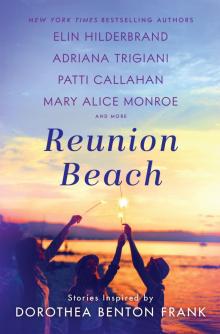 Reunion Beach
Reunion Beach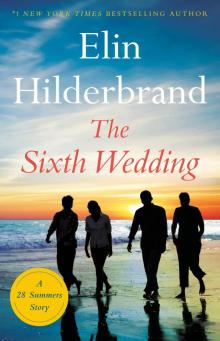 The Sixth Wedding
The Sixth Wedding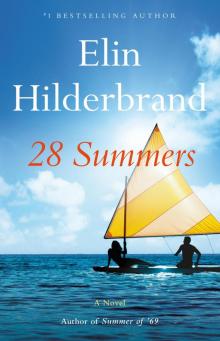 28 Summers
28 Summers Summer of '79: A Summer of '69 Story
Summer of '79: A Summer of '69 Story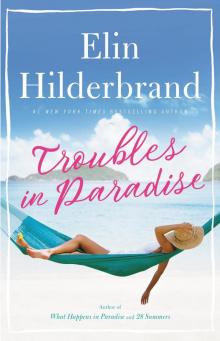 Troubles in Paradise
Troubles in Paradise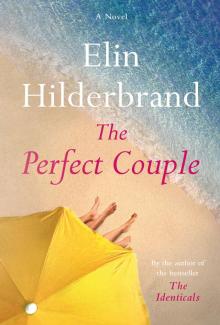 The Perfect Couple
The Perfect Couple Winter Solstice
Winter Solstice Barefoot: A Novel
Barefoot: A Novel